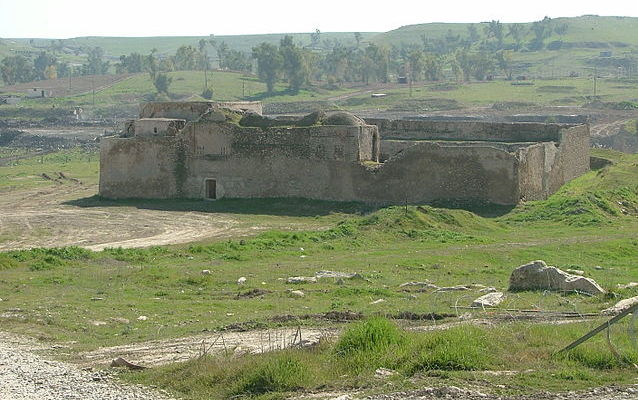Al-Arabiya and AFP are reporting that the city of Mosul’s Christian community, dating to the 2nd Century CE, has evacuated en masse to Iraqi Kurdistan in the past 48 hours, following a specific threat of extermination from ISIS. Although it’s possible some members are still hiding in the city, the leaders of the close-knit and small community believe everyone is gone. Some who had pre-emptively fled when the city fell to ISIS in early June had tentatively returned, hoping for the best, but today the evacuations appeared definitive and total.
Christians have fled Iraq’s northern city of Mosul en masse before a Saturday deadline issued by the al-Qaeda-inspired Islamic State of Iraq and Syria (ISIS) for them to either convert to Islam, pay tax, leave or be killed.
[…]
Patriarch Louis Sako told AFP on Friday: “Christian families are on their way to Dohuk and Arbil,” in the neighboring autonomous region of Kurdistan. “For the first time in the history of Iraq, Mosul is now empty of Christians,” he said.
Witnesses said messages telling Christians to leave the city by Saturday were blared through loudspeakers from the city’s mosques Friday.
[…]
“We were shocked by the distribution of a statement by the Islamic State calling on Christians to convert to Islam, or to pay unspecified tribute, or to leave their city and their homes taking only their clothes and no luggage, and that their homes would then belong to the Islamic State,” Sako said.
It remains to be seen if any of the community will return if ISIS is ever dislodged from Mosul in the near future, but they may not have homes to return to. In past waves of emigration of ethnic and religious minorities from the city, especially under the intentional policies of Saddam Hussein, abandoned homes have quickly been taken over by Sunni Arabs.
For the past 18-19 centuries, Mosul was the continuous center of Iraq’s Assyrian Christian ethno-religious community, despite basically every war in regional history coming through. The community was a diverse set of old school (2nd century CE) Middle Eastern Christian sects within the Assyrian/Syriac/Chaldean ethnicity, whose members still speak and read Aramaic, one of the most important language families in Middle Eastern ancient and classical history, as well as across multiple religions.

St. Elijah’s Monastery, near Mosul, a site dating to 595 CE, seen here in 2005. (Credit: Doug – Wikimedia)
Unfortunately, most of Iraq’s Assyrians had been fleeing the city and country since the 2003 invasion, even before the latest — and perhaps final — crisis, with ISIS.
The city has long been a holdout against sectarian pressures until now. Mosul became the regional capital of what is now Iraq under the 7th century Umayyad Caliphate (an early Muslim dynasty), even as it remained a major — even rising — Christian city. It also maintained a significant Jewish population well into and past the era of the Crusades.
After being the site of many power plays by competing Arab, Turkic, and Persian factions, the city was transferred without destruction to a grandson of Genghis Khan, under one of the Mongol sub-empires. Christians, including those in Mosul, came to play an important role in the Mongol courts in that part of the Mongol-ruled world.
In the period that followed World War I, Mosul continued to play a key role in the economics and military affairs of Iraq. The city itself became dominated by Arab Iraqi military elites, while the suburbs and outlying areas across the river remained predominantly non-Arab (primarily Kurdish, a much larger minority ethnicity in the country). Many of these minorities fled to what is now the Kurdish Regional Government’s area, when Saddam Hussein began a brutal ethnic cleansing campaign of the Nineveh Province to punish the Kurdish uprising in 1991 (initiated at the ill-conceived urging of the United States and Britain).
The city was covered by US/UK air patrols from 1991 to 2003 (when the US captured it outright), but ground campaigns against non-Arab populations continued during the period. Even with that, Kurdish, Assyrian, and other minority groups survived in the greater Mosul area. Sectarian chaos in the post-2003 period pushed more minorities — and the Christians in particular — out of Mosul, however.
This weekend, ISIS seems to have finished the task Saddam Hussein began. This news is a true cultural and historical tragedy.
Editor’s note: The historical text in this post is adapted and condensed from our recent article 11 interesting facts from the history of Mosul.


